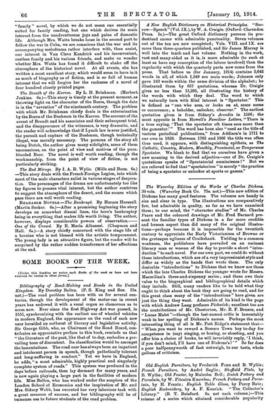A New English Dictionary on Historical Principles. "Sor- row—Speech" (Vol.
IX.), by W. A. Craigie. (Oxford: Clarendon Press. 5s.)—The great Oxford dictionary pursues its pre- destined career with admirable punctuality. Seven volumes out of the ten are now completed; Vole. VIII. and IX. are more than three-quarters published, and Sir James Murray is well into the tenth and last volume. Nothing in the work, vast and many-sided as it is, is more admirable (to such at least as have any conception of the labour• involved) than the regularity with which the quarterly parts now come from the press. That before us (for January, 1914) contains 2,642 words in all, of which 1,249 are main words ; Johnson only gave 243 words within the same division of the alphabet; he illustrated them by 657 quotations, whereas Dr. Craigie gives no less than 15,285, all illustrating the history of the words with which they deal. The word to which we naturally turn with filial interest is " Spectator." This is defined as "one who sees, or looks on at, some scene or occurrence ; a beholder, onlooker, observer." The earliest quotation given is from Sidney's Arcadia in 1586; the most apposite is from Howell's Familiar Letters, " There is a true saying, That the spectator oft times sees more than the gamester.'" The word has been also "used as the title of various periodical publications," from Addison's in 1711 to our own in 1828. Between 1792 and 1866 the title was often thus used, it appears, with distinguishing epithets, as The Catholic, Country, Modern, Monthly, Provincial, or Temperance Spectator. We blush to find that we ourselves have given a new meaning to the derived adjective—one of Dr. Craigie's quotations speaks of " Speetatorial omniscience I" But we are relieved to find that " spectatorism " is merely " the practice of being a spectator or onlooker at sports or games."






































 Previous page
Previous page